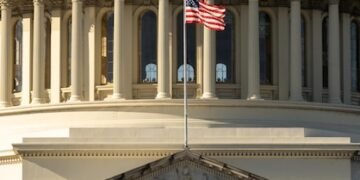Student Loan Forgiveness 2025: Eligibility & Planning Adaptations

Student Loan Forgiveness Programs in 2025 are anticipated to undergo significant changes potentially affecting eligibility criteria and requiring borrowers to adapt their financial planning strategies to navigate the evolving landscape.
Navigating the landscape of Student Loan Forgiveness Programs in 2025: Eligibility and Financial Planning Adaptations can feel like traversing a maze, but understanding potential changes and how they impact your financial strategy is crucial. Let’s delve into what you need to know to prepare.
Understanding the Current Student Loan Forgiveness Landscape
The current student loan forgiveness landscape is shaped by various programs, each with its own set of criteria and requirements. These programs aim to provide relief to borrowers struggling with student debt, but it’s essential to understand their scope and limitations.
Existing Forgiveness Programs
Several forgiveness programs are currently in place, offering different pathways to student loan relief. These programs include:
- Public Service Loan Forgiveness (PSLF): For those employed by qualifying government or non-profit organizations.
- Income-Driven Repayment (IDR) Forgiveness: Available after 20-25 years of qualifying payments under an IDR plan.
- Teacher Loan Forgiveness: For teachers who serve in low-income schools for five consecutive years.
Each program has specific eligibility criteria that borrowers must meet to qualify for forgiveness. Understanding these criteria is the first step in determining which program is the right fit for your situation.
Recent Changes and Updates
The student loan forgiveness landscape has seen considerable changes in recent years, influencing who qualifies and how forgiveness is applied. Staying informed about these updates is vital for borrowers.
- The Biden administration’s proposed student loan forgiveness plan faced legal challenges and was ultimately struck down by the Supreme Court.
- The “SAVE” Plan: A new income-driven repayment plan that lowers monthly payments and shortens the time to forgiveness for some borrowers.
- Ongoing debates in Congress about the future of student loan forgiveness and potential reforms to existing programs.
These changes underscore the need for borrowers to stay informed and adapt their financial planning strategies accordingly.
In summary, the current student loan forgiveness landscape is dynamic, with existing programs subject to changes and new proposals influencing the future of student debt relief. Understanding these aspects is essential for effective financial planning.
Potential Shifts in Eligibility Criteria for 2025
Looking ahead to 2025, there’s anticipation of further shifts in eligibility criteria for student loan forgiveness programs. These potential changes could significantly impact borrowers’ ability to qualify for relief.
Factors Influencing Eligibility
Several factors are likely to influence eligibility criteria for student loan forgiveness in 2025. These include:
- Political Climate: The outcome of the 2024 elections could significantly impact the direction of student loan policy.
- Economic Conditions: Changes in the economy, such as inflation and unemployment rates, could influence the availability of forgiveness programs.
- Program Funding: The level of funding allocated to student loan forgiveness programs will directly impact their scope and eligibility requirements.
Understanding these factors is crucial for anticipating potential shifts in eligibility criteria.
Possible Scenarios for 2025
Based on current trends and potential influencing factors, here are some possible scenarios for student loan forgiveness eligibility in 2025:
- Stricter Income Requirements: Income thresholds for income-driven repayment plans could be lowered, making it more difficult for higher-income borrowers to qualify.
- Tighter Employment Guidelines: The definition of “qualifying employment” for PSLF could be narrowed, potentially excluding certain types of jobs.
- Increased Documentation Requirements: Borrowers may be required to provide more extensive documentation to prove their eligibility for forgiveness.
While these are just potential scenarios, they highlight the importance of being prepared for change.
Strategies for Adapting to Changes
Given the potential for shifts in eligibility criteria, borrowers should consider the following strategies to adapt:
- Review Current Eligibility: Regularly review your eligibility for existing forgiveness programs and make sure you meet all requirements.
- Document Everything: Keep meticulous records of your employment, income, and loan payments to support your eligibility for forgiveness.
- Seek Professional Advice: Consult with a financial advisor or student loan expert to develop a customized plan for managing your debt.
By staying informed and proactive, borrowers can navigate potential changes in eligibility criteria and maximize their chances of accessing student loan forgiveness.
In conclusion, anticipating potential shifts in eligibility criteria for student loan forgiveness in 2025 is crucial for borrowers. By understanding the factors influencing these changes and adopting proactive strategies, borrowers can adapt and protect their access to debt relief.
Financial Planning Adaptations: Preparing for Uncertainty
Uncertainty surrounding student loan forgiveness programs requires borrowers to adapt their financial planning strategies. Creating a flexible and comprehensive financial plan is essential for navigating the evolving landscape.
Assessing Your Current Financial Situation
Before making any changes to your financial plan, it’s essential to assess your current financial situation. This includes:
- Calculating Your Debt-to-Income Ratio: Determine how much of your income is going towards debt payments.
- Evaluating Your Credit Score: A good credit score can help you access better interest rates on loans.
- Creating a Budget: Track your income and expenses to identify areas where you can save money.
This assessment will provide a solid foundation for developing a financial plan that meets your individual needs.
Building an Emergency Fund
An emergency fund is a crucial component of any financial plan, providing a safety net in case of unexpected expenses. Aim to save at least 3-6 months’ worth of living expenses.
Prioritizing Debt Repayment
Even with the possibility of loan forgiveness, it’s important to prioritize debt repayment. Explore different repayment options, such as:
- Income-Driven Repayment Plans: These plans adjust your monthly payments based on your income and family size.
- Loan Consolidation: Combining multiple loans into one can simplify repayment and potentially lower your interest rate.
- Refinancing: If you have good credit, refinancing your student loans can help you secure a lower interest rate.
Investing for the Future
While managing student loan debt is important, it’s also essential to invest for the future. Consider:
- Retirement Savings: Contribute to a 401(k) or IRA to ensure you have enough savings for retirement.
- Investing in Stocks and Bonds: Diversify your investment portfolio to maximize your returns.
- Real Estate: Investing in real estate can provide long-term financial security.
By balancing debt repayment with investing, you can build a strong financial foundation for the future.
In summary, preparing for uncertainty in student loan forgiveness requires borrowers to adapt their financial planning strategies. Assessing your current situation, building an emergency fund, prioritizing debt repayment, and investing for the future are all essential steps in navigating the evolving landscape.
Exploring Alternative Repayment Strategies
When traditional loan forgiveness programs face uncertainty, borrowers can explore various alternative repayment strategies to manage their student debt effectively. These strategies can provide flexibility and potential relief.

Debt Management Programs
Debt management programs (DMPs) can provide structured support for borrowers struggling with multiple debts, including student loans. DMPs typically involve working with a credit counseling agency to create a budget and negotiate lower interest rates or monthly payments.
Negotiating with Loan Servicers
Borrowers can often negotiate directly with their loan servicers to explore alternative repayment options. This may include:
- Temporary Forbearance: A temporary pause on loan payments due to financial hardship.
- Reduced Payment Plans: Negotiating a lower monthly payment based on your current income.
- Loan Modification: Changing the terms of your loan to make it more manageable.
Employer Assistance Programs
Some employers offer student loan repayment assistance as a benefit to attract and retain talent. These programs may provide:
- Direct Repayment Assistance: Employer contributions towards your student loan debt.
- Financial Counseling: Access to financial experts who can help you develop a repayment plan.
- Matching Contributions: Employer matches to your student loan payments, similar to a 401(k) match.
State-Sponsored Programs
Several states offer their own student loan repayment assistance programs, typically targeted at specific professions or industries. These programs may provide:
- Loan Repayment Grants: Direct grants to help borrowers repay their student loans.
- Tax Credits: State tax credits for student loan interest payments.
- Public Service Incentives: Loan forgiveness or repayment assistance for borrowers working in qualifying public service jobs within the state.
Researching available state-sponsored programs can uncover valuable resources for managing student debt.
In conclusion, exploring alternative repayment strategies is essential for borrowers facing uncertainty in student loan forgiveness programs. Debt management programs, negotiating with loan servicers, employer assistance programs, and state-sponsored programs can provide valuable options for managing student debt effectively.
Seeking Professional Financial Advice
Navigating the complexities of student loan forgiveness and financial planning often requires professional guidance. Consulting with a qualified financial advisor or student loan expert can provide personalized advice and support.
Benefits of Professional Advice
Seeking professional financial advice offers several benefits, including:
- Personalized Guidance: Tailored advice based on your individual financial situation and goals.
- Expert Knowledge: Access to professionals who are knowledgeable about student loan forgiveness programs and financial planning strategies.
- Objective Perspective: An unbiased assessment of your financial situation and recommendations for improvement.
Finding the Right Advisor
When seeking professional financial advice, it’s important to find the right advisor for your needs. Consider:
- Credentials and Experience: Look for advisors who are certified financial planners (CFPs) or have experience working with student loan borrowers.
- Fee Structure: Understand how the advisor is compensated, whether it’s through fees or commissions.
- References and Reviews: Check references and read online reviews to get a sense of the advisor’s reputation and track record.
Questions to Ask a Potential Advisor
Before hiring a financial advisor, be sure to ask them the following questions:
- What is your experience with student loan forgiveness programs?
- How do you develop a personalized financial plan?
- What are your fees and how are they structured?
- Can you provide references from other clients?
Asking these questions can help you find an advisor who is a good fit for your needs.
Resources for Finding Financial Advisors
Several resources can help you find qualified financial advisors, including:
- The Certified Financial Planner Board of Standards (CFP Board)
- The National Association of Personal Financial Advisors (NAPFA)
- The Financial Planning Association (FPA)
These organizations can provide directories of advisors in your area.
In summary, seeking professional financial advice is a valuable step in navigating student loan forgiveness and financial planning. By finding the right advisor and asking the right questions, you can receive personalized guidance and support to achieve your financial goals.
Long-Term Financial Wellness: Beyond Loan Forgiveness
While student loan forgiveness can provide significant relief, it’s essential to focus on long-term financial wellness. Building a strong financial foundation will enable you to achieve your goals and secure your future, regardless of the uncertainty surrounding loan forgiveness programs.
Setting Financial Goals
Begin by setting clear and achievable financial goals. This might include:
- Saving for Retirement: Determine how much you need to save each month to reach your retirement goals.
- Buying a Home: Create a plan for saving for a down payment and managing mortgage payments.
- Starting a Business: Develop a business plan and secure funding for your venture.
Creating a Comprehensive Financial Plan
Develop a comprehensive financial plan that encompasses all aspects of your financial life. This plan should include:
- Budgeting and Expense Tracking: Monitor your income and expenses to identify areas where you can save money.
- Debt Management: Create a plan for paying off debt, including student loans, credit cards, and other obligations.
- Investment Strategy: Develop an investment strategy that aligns with your risk tolerance and financial goals.
- Insurance Coverage: Ensure you have adequate insurance coverage to protect your assets and income.
- Estate Planning: Create a will and other estate planning documents to ensure your assets are distributed according to your wishes.
Staying Informed and Proactive
Stay informed about changes in student loan policy and financial planning strategies. This will enable you to adapt your plan as needed and make informed decisions about your financial future.
- Read Financial News: Stay up-to-date on the latest financial news and trends.
- Attend Financial Seminars: Attend seminars and workshops to learn about financial planning topics.
- Consult with a Financial Advisor: Regularly consult with a financial advisor to review your financial plan and make adjustments as needed.
In conclusion, achieving long-term financial wellness requires a holistic approach that goes beyond student loan forgiveness. By setting financial goals, creating a comprehensive financial plan, and staying informed and proactive, you can build a strong financial foundation for the future.
| Key Aspect | Brief Description |
|---|---|
| 📝 Eligibility Changes | Potential shifts include stricter income requirements and tighter employment guidelines. |
| 💡 Financial Planning | Assess your situation, build an emergency fund, and prioritize debt repayment and investing. |
| 💼 Repayment Strategies | Explore debt management programs, negotiate with servicers, and look for employer assistance. |
| 👨💼 Professional Advice | Seek personalized guidance from a financial advisor or student loan expert. |
Frequently Asked Questions
▼
▼
▼
▼
▼
Conclusion
As we look towards 2025, navigating the landscape of student loan forgiveness programs requires proactive financial planning and adaptability. By staying informed about potential changes, exploring alternative repayment strategies, and seeking professional advice, borrowers can secure their financial future, regardless of the uncertainties surrounding student debt relief.




